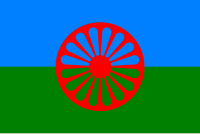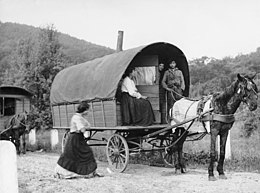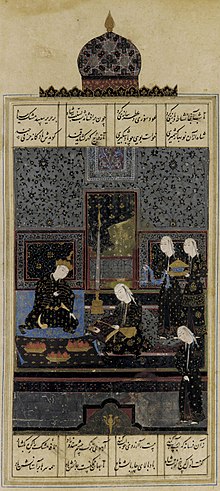Wp/bgn/لۆڑی ئان
 Romani flag created in 1933 and accepted by the 1971 World Romani Congress | |
| موچین جمئیت | |
|---|---|
|
2 million ~ 12 million[1][2][3] Also see Romani people by country | |
| مناطق با جمعیت قابل توجه | |
|
1,000,000 (0.32%)[4] | |
|
800,000 (0.41%)[5] | |
|
650,000 (1.62%)[6] | |
|
621,573 (3.3%)[7] | |
|
500,000 (0.72%)[8] | |
|
500,000 (0.79%)[9] | |
|
370,908 (4.67%)[10] | |
|
205,720 (2.02%)[11] | |
|
200,000 (1.82%)[12] | |
|
189,920 (1.71%)[13] | |
|
182,766 (0.13%)[14] | |
|
147,604 (2.05%)[15] | |
|
130,000 (0.22%)[16] | |
|
120,000 (0.15%)[17] | |
|
90,000 (0.15%)[18] | |
|
53,879 (2.85%)[19] | |
|
53,000 (0.05%)[20] | |
| 50,000 – 100,000[21] | |
|
47,587 (0.098%)[22] | |
|
30,000 – 50,000 (0.3%) | |
|
10,000 – 15,000 (0.3%) | |
| زبانئان | |
| Romani, languages of native region | |
| دین | |
|
Christianity[23] Islam[23] Shaktism[23] | |
| مربوتین قوم و سیادین گروپ ئان | |
| Dom, Lom, Domba; other Indo-Aryans | |



لۆڑی (پارسی تا: کولی) یک تیت و پاشانین قومی نامی اینت که به دنیایی موچین جاگانی تا تالان انت، خصوصا به اروپا و همیرنگ به ایرانئ مختلفین بخشانی تا هنتچون بلوچستان و سیستانی ولایتی زابل تا زندگی دارنت. لۆڑی به سراسر جهانی تا په رخص و وانگان زانته ئه به ینت و آ مردم انت که آوانی بار و بُنگ موچین وختا آوانی پشتا اینت و شه یک جا به دیگه جاهی رونت.
تاریخچه
[edit | edit source]Origins
[edit | edit source]Shahnameh legend
[edit | edit source]

Early Modern history
[edit | edit source]

World War II
[edit | edit source]Society and traditional culture
[edit | edit source][[File:A Gipsy Family Fac simile of a Woodcut in the Cosmographie Universelle of Munster in folio Basle 1552.png|right|thumb|upright=1.3|A Gipsy
Belonging and exclusion
[edit | edit source]Religion
[edit | edit source]Template:Wp/bgn/Refimprove section [[File:Tziganes aux Saintes-Maries de la Mer.jpg|thumb|upright=1.3|Christian Romanies during the pilgrimage at Saintes-Maries-de-la-Mer in France, 1980s]]
Beliefs
[edit | edit source]Ceremonies and practices
[edit | edit source]Balkans
[edit | edit source]
Other regions
[edit | edit source]
Music
[edit | edit source][[File:Romani population average estimate.png|thumb|left|upright=1.2|Distribution of the Romani people in Europe (2007 Council of Europe "average
Fictional representations
[edit | edit source][[File:Vincent van Gogh- The Caravans - Gypsy Camp near Arles.JPG|thumb|left|upright=1.2|Vincent van Gogh: The Caravans – Gypsy Camp near Arles (1888, oil on canvas)]]
- ↑ "Rom". Encyclopædia Britannica Online. Retrieved 2010-09-15.
According to Encyclopaedia Britannica, estimates of the total world Romani population range from two million to five million.
- ↑ "Online version". Retrieved 2010-09-15.
Lewis, M. Paul (ed.), 2009. Ethnologue: Languages of the World, Sixteenth edition. Dallas, Tex.: SIL International. Ian Hancock's 1987 estimate for "all Gypsies in the world" was 6 to 11 million.
- ↑ "EU demands action to tackle Roma poverty". BBC News. 2011-04-05.
- ↑ Webley Kayla (October 13, 2010). "Hounded in Europe, Roma in the U.S. Keep a Low Profile". Time.
Today, estimates put the number of Roma in the U.S. at about one million.
- ↑ The Special Secretariat for the Promotion of Racial Equality estimates the number of "ciganos" (Romanis) in Brazil at 800,000 (2011). The 2010 IBGE Brazilian National Census encountered gypsy camps in 291 of Brazil's 5,565 municipalities."Falta de políticas públicas para ciganos é desafio para o governo". R7. 2011. Retrieved 2012-01-22.
- ↑ "The Situation of Roma in Spain" (PDF). Open Society Institute. 2002. Archived from the original on 2007-12-01. Retrieved 2010-09-15.
The Spanish government estimates the number of Gitanos at a maximum of 650,000.
- ↑ "Rezultatele finale ale Recensământului din 2011 - Tab8. Populaţia stabilă după etnie – judeţe, municipii, oraşe, comune" (in Romanian). National Institute of Statistics (Romania). 5 July 2013. Retrieved 18 December 2013. However, various organizations claim that there are 2 million Romanis in Romania. See [۱]
- ↑ "Roma rights organizations work to ease prejudice in Turkey". EurasiaNet. 22 July 2005. Retrieved 2010-09-15.
There are officially about 500,000 Roma in Turkey.
- ↑ "Situation of Roma in France at crisis proportions". EurActiv Network. 7 December 2005. Retrieved 2010-09-15.
The Romani population in France is officially estimated at around 500,000.
- ↑ "Population By Districts And Ethnic Group As Of 01.03.2001". Retrieved 2010-09-15.
Census 2001 in Bulgaria: 370,908 Roma
- ↑ "Population by national/ethnic groups". Hungarian Central Statistical Office. Retrieved 2010-09-15.
Census 2001 in Hungary: 205,720 Roma/Bea
- ↑ "The Romani population in Greece is officially estimated at 200,000". Hellenic Republic National Commission For Human Rights. Retrieved 2010-09-15.
Census 2001 in Hungary: 205,720 Roma/Bea
- ↑ Census 2001 in Slovakia
- ↑ "National Composition Of Population And Citizenship" (Excel). perepis2002.ru. Retrieved 2010-09-16.
Census 2002 in Russia: 182,766 Roma.
- ↑ http://webrzs.stat.gov.rs/WebSite/userFiles/file/Aktuelnosti/Prezentacija_Knjiga1.pdf
- ↑ Demographics of Italy#Languages Estimated by Ministero degli Interni del Governo Italiano.
- ↑ [۲] Berlin-Institut für Bevölkerung und Entwicklung: Roma in Deutschland
- ↑ [۳] Ethnologue.com
- ↑ "The 2002-census reported 53,879 Roma and 3,843 'Egyptians'". Republic of Macedonia, State Statistical Office. Retrieved 2010-09-17.
- ↑ "Catemaco gypsies". Catemaco.info. Retrieved 2013-03-12.
- ↑ Sametingen. Information about minorities in Sweden (Swedish)
- ↑ State statistics committee of Ukraine - National composition of population, 2001 census (Ukrainian)
- ↑ 23.0 23.1 23.2 Gall, Timothy L. (ed). Worldmark Encyclopedia of Culture & Daily Life: Vol. 4 - Europe. Cleveland, OH: Eastword Publications Development (1998); pp. 316, 318 : "Religion: An underlay of Hinduism with an overlay of either Christianity or Islam (host country religion) "; "Roma religious beliefs are rooted in Hinduism. Roma believe in a universal balance, called kuntari... Despite a 1,000-year separation from India, Roma still practice 'shaktism', the worship of a god through his female consort... "
